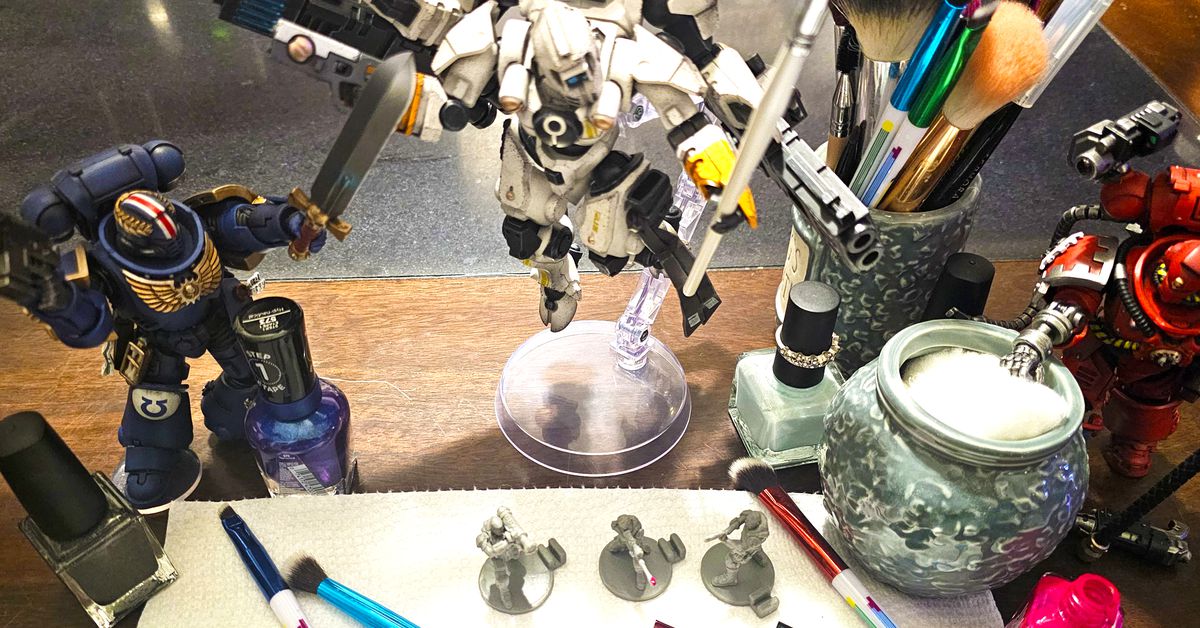Sometimes, I do my nails. Sometimes, I paint my minis. And sometimes, I paint my minis while doing my nails. The disciplines of nail art and painting miniatures have a lot in common. They require patience and a steady hand, and they share many of the same tools and materials.
I don’t believe that beauty products can or should replace dedicated miniature painting tools. But in some cases, these beautician essentials can perform the same task at a fraction of the price of products made expressly for painting minis. In some cases, you can achieve unexpectedly cool results.
If you’re ready to expand your miniature-painting arsenal with some less conventional tools, here are some of our suggestions that you can find online, or perhaps in the beauty section of your local drugstore.
:no_upscale()/cdn.vox-cdn.com/uploads/chorus_asset/file/25361737/81T_X9btFfL._SL1500_.jpg)
Image: Artdone
31-piece nail art brush set
The best place to start is with synthetic nail art brushes. Pound for pound, these probably aren’t too different from what’s stocked at your local hobby shop. They come in a similar variety of brush shapes and sizes. Unless you find the aesthetic of their designs particularly offensive, you might want to consider going with a pack of cheap nail art brushes if and when your current mini-painting brushes need to be replaced.
:no_upscale()/cdn.vox-cdn.com/uploads/chorus_asset/file/25361739/71UjwY6q7iL._SL1000_.jpg)
Image: V05
V05 matte hair clay
Painting a ton of minis can really put your brushes through the wringer, leaving them frayed and caked with acrylic residue after multiple uses. However, with adequate maintenance you can extend the lifespan of even the cheapest synthetic brush. While soap and hot water pay dividends in keeping your brushes feeling like new, their tips will eventually lose their shape. To amend this, we’re turning to hair products.
Full credit for this clever suggestion goes out to Midwinter Minis. Using a small amount of matte hair clay on your brush tips and gently shaping them in your palm before leaving them overnight to set.
:no_upscale()/cdn.vox-cdn.com/uploads/chorus_asset/file/25361741/71V0sk6BnbL._SL1500_.jpg)
Image: Sally Hansen
Sally Hansen Crackle Overcoat
While nail polish shares some similar properties with model paint, we wouldn’t recommend using it unless you’re desperate. Generally speaking, nail polish tends to be a little too thick to use on models, and is sometimes more expensive per bottle than most Citadel paints. However, there are some similar nail supplies that can help you achieve some interesting effects, if you’re in a bind.
For instance, using a matte or glossy nail polish top coat can give your models a slimy or dry finish. Using “crackle” top coats can be great for adding terrain textures similar to those found on Citadel’s “Martian Ironearth” or “Astrogranite.”
:no_upscale()/cdn.vox-cdn.com/uploads/chorus_asset/file/25361744/71tbrFXMvEL._SL1500_.jpg)
Image: Mizhse
3D nail art gel
If you’d like to add some additional texture to your minis, 3D nail art resin gel comes in a tube for easy application and is available in a variety of colors. Use this to add veins, pustules, or other unsightly organic accents to your Plague Knight or Tyranid models.
:no_upscale()/cdn.vox-cdn.com/uploads/chorus_asset/file/25361747/81mxh1oDFpL._AC_SL1500__copy.jpg)
Image: Amazon
Metallic nail powder and nail flakes
To add a metallic sheen to your minis, you might consider experimenting with metallic nail powder or flakes. Just prep your mini by applying a thin coat of clear, glossy paint to the desired area, and with a separate brush, lightly dust your model with your preferred accent. Unlike generic glitter, these options are fine enough that they likely won’t add extra texture to your model. Just make sure that any brush you use with glitter or flakes of any kind is labeled and remains dedicated to this purpose. Not unless you want glitter to end up on all of your future minis, that is.
:no_upscale()/cdn.vox-cdn.com/uploads/chorus_asset/file/25361750/61UVzdL4L0L._SL1500_.jpg)
Image: Airsee
Electric nail trimmer
Anyone who’s assembled miniatures or scale models knows how annoying sprues can be. While cuticle trimmers can be an inexpensive way to liberate your minis from their molds, they’re generally not robust enough for prolonged use against thick plastic, and their shape makes them difficult to wedge into hard-to-reach spaces.
Even once you’ve gathered all of your bits, manually sanding down all of their attachment points can be a chore. While a rotary drill like a Dremel tool is a fine choice and well suited to saw through a variety of materials, an inexpensive electric nail drill can get the job done nearly as well. Most models come packaged with a variety of bits that should make short work of any attachment points or imperfections.
:no_upscale()/cdn.vox-cdn.com/uploads/chorus_asset/file/25361757/61FTHhqpbXL._SL1500_.jpg)
Image: Onilab
Onilab centrifuge
If you’re using a bunch of different paints at once, ensuring they’re all adequately mixed can be a pain. If you’d prefer to automate this annoying process, this Onilab miniature centrifuge used for nail polish is equally suited to incorporating acrylic paints in a variety of different-sized bottles.
:no_upscale()/cdn.vox-cdn.com/uploads/chorus_asset/file/25361762/0v9s8u7q.jpg)
Image: Amazon
Push pump bottle
Mixing up your water and paint thinner is a mistake you only make once. If you’re looking to avoid this type of unfortunate incident, you might want to keep your chemicals relegated to a dedicated container. This kind of small push pump bottle is typically reserved for acetone (you can put whatever you want in it, though), and allows you to dole out small amounts onto a cloth or whatever you use to clean your brushes.

